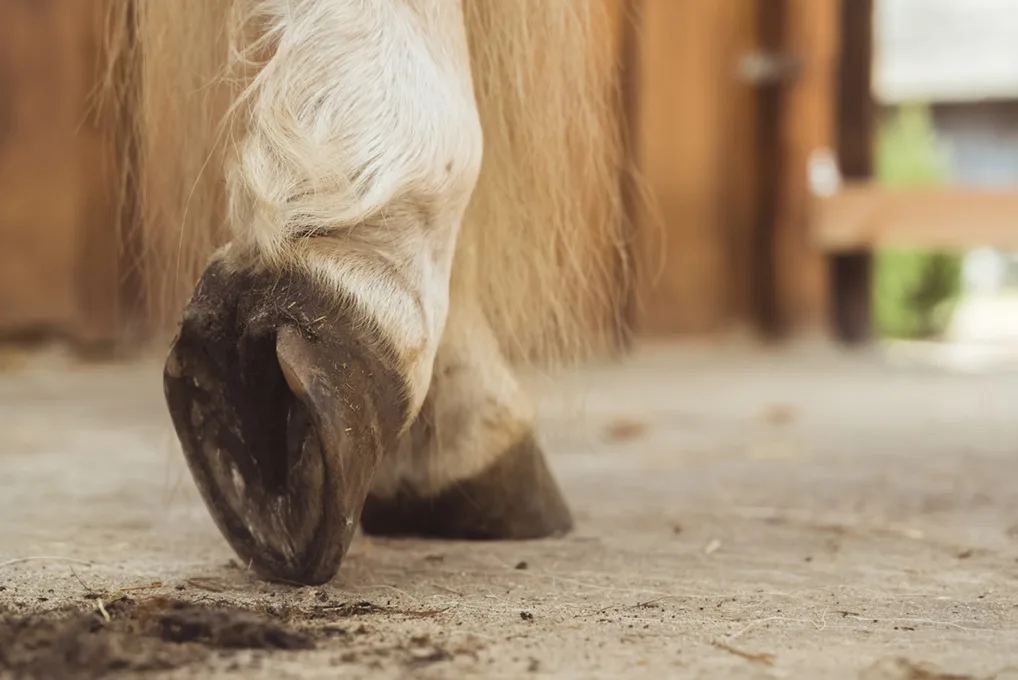Many horse owners are plagued by hoof issues like chipping, cracking, slow growth and general softness, and whilst there are a multitude of factors that can contribute to these problems, nutrition is definitely a key one to address.
Here, we give you a brief rundown of the nutritional elements necessary for optimal hoof health.
It all starts with energy
When looking at your horse’s nutrition, the first point to consider is the amount of energy in the diet, i.e. are your horse’s caloric needs being met? When a horse is deficient in energy, their body prioritises the basic functions necessary for survival which can leave hooves lacking. Yet, when a horse is oversupplied with energy, he is at risk of becoming obese and developing laminitis. As with all things, therefore, balance is the key!
TOP TIP
Regular body condition scoring of your horse is a good way to assess how well your horse’s energy needs are being met by their current diet.
When additional energy is required in the equine diet, adding an energy-dense fat source (vegetable oil, flax seeds or soya) is a good way to increase caloric content without increasing sugar levels. In relation to hoof health, fats in the diet have been suggested to play a role in improving the hoof wall barrier.
Protein – the main component of the hoof
As a significant portion of the hoof is composed of the protein keratin, it should be no surprise that protein is needed for strong hoof growth. Proteins are composed of many amino acids, and for the horse, ten of these amino acids are considered ‘essential’. This means that they must be supplied by the diet as the horse’s body cannot produce them itself. So, when creating a diet to support hoof health, the horse’s protein requirement must be adequately met, including the specific requirements of each of the ten essential amino acids.
To ensure all essential amino acid requirements are being addressed may need the assistance of an equine nutritionist. Still, a good base protein level comes through feeding legume hay, with the possible addition of linseed or canola meal.
However, as with most other nutrients, too much protein is not healthy either. When protein is oversupplied in the diet, the horse will excrete the excess nitrogen and urea in urine. If not cleaned sufficiently regularly, the increased urine can lead to wet ammonia-laden beds that can damage the hoof wall.
Small but mighty – vitamins and minerals
Once the basic energy and protein requirements are met, vitamins and minerals must be considered. Vitamins and minerals essential to hoof health include copper, zinc, calcium, phosphorus and vitamin B7 (biotin).
Zinc and copper both play a role in keratin protein synthesis and in forming the bonds within the keratin. Calcium is important for cells in the hoof horn; it has been reported that the hooves are weaker when there is a lack of calcium in the diet.
Additionally, when discussing minerals, it is important to consider the ratios in which they are supplied, not just the individual quantities. For example, if phosphorus is over-supplied in the diet, the calcium-phosphorus ratio is affected, ultimately reducing calcium absorption.
Biotin is a water-soluble vitamin, and plenty of research suggests a positive role for this vitamin in hoof health. Since biotin contains sulphur, its main function is in strengthening the connective tissue in the hoof wall.
NOTE
It is important to remember that the hoof takes time to grow, so diet changes take time to reflect. Don’t be too impatient; stick with the dietary programme and monitor the response after a few months to get an idea of whether you are heading in the right direction.
Take home message
Ultimately, a variety of factors play a role in hoof health, but avoiding chipping, cracking, softness, and slow growth certainly requires good nutrition. If your horse has poor hoof health, it is worth speaking to an equine nutritionist to ensure their diet is balanced. They will also be able to recommend supplements that can add any extra ingredients your horse might need for optimal hoof health.

